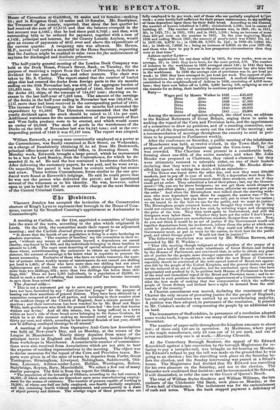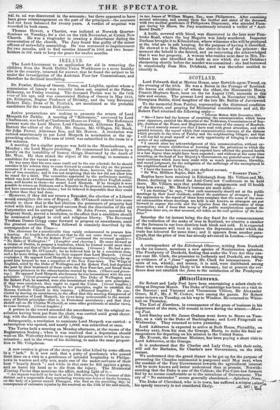A meeting at Carlisle, on the 21st, appointed a committee
of inquiry into the state of the town, according to the plan which originated in Leeds. On the 28th, the committee made their report to an adjourned meeting ; and the Carlisle Journal gives a summary of it " It shows that the fourth of our population is living in a state bordering on absolute starvation. The number of families,' say the committee in their re port, 'without any means of subsistence beyond a dependence on casual charity, was found to be 309, and the individuals belonging to these families to amount to 1,146. The cases most deserving of special attention are of course
those where, notwithstanding the endeavour to obtain an independent sub sistence, the amount of earnings is far below what is requisite to procure the barest necessaries. Exclusive of those who have no visible resources, the num ber of persons whose weekly means of maintenance do not exoeed one shilling per head is 1,465; of those who have more than one shilling but not above eighteenpence per head, the number is 1,623; above eighteenpence but not
more than two shillings, 692; more than two shillings but below three shillings, 635.' Thus we have 5,561 individuals, in a population of 22,000, reduced to such a state of suffering that immediate relief has become necessary to save them from actual famine."
The Journal adds " This is not a statement got up to serve any party purpose. The details have not been furnished by any 'Anti-Corn-law League' for the purpose of
bearing out their assertions of general distress. They have been obtained by a
committee composed of men of all parties, and including in their number most of the resident clergy of the Church of England, from a minute personal in spection; and their correctness has been vouched for by Mr. Head and Major Wilde, both gentlemen who think the present Corn-law the best that human wisdom can devise.' And all this misery, too, is being suffered in a town within an hour's ride of those broad acres belonging to Sir James Graham, for which he is at this moment seeking an increased rental of some twenty or thirty per cent, and which, according to his poetical flourish of last year, should now be diffusing unalloyed blessings to all around."
A meetingof deputies from Operative Anti-Corn-law Associations was held on New-year's Day, and on Monday, at the rooms of the
League in Manchester. Nearly thirty deputies from many . of the principal towns in England and Scotland attended, besides delegates from workshops in Manchester. A considerable number of communica tions were also received from Associations which are not able to bear the expense of sending representatives to the meeting. The object was to devise measures for the repeal of the Corn and Provision taxes. Re ports were given in of the state of towns by deputies from Forfar, Great Torrington, Birmingham, Liverpool, Nottingham, Saddleworth, Oldham, Leicester, Ashton-under-Lyne, Halifax, Warrington, Bolton, Stalybridge, Royton, Bury, Macclesfield. We select a few out of many similar passages. The first is from the report for Oldham
" The population of the township of Oldham, according to the last census, is 42,593; of which nine-tenths are dependent upon some manufacturing employ ment for the means of existence. The number of persons capable of working is 19,200; of whom one-half are fully employed, one-fourth partially employed, and the :ernaining fourth without employment, and consequently in a state of abject poverty and distress. The average wages of those persons who are
fully employed is 8s. per week, and of those who are partially employed per
week ; a sum hardly half sufficient for their proper maintenance, to say nothing of those dependent upon them for their daily bread. According to the Census, the number of houses inhabited is 7,892; uninhabited, 1,106; and in course of building. 27. The number of uninhabited houses was, in 1801, 19; in 1811, 39; in 1821, 75; in 1831, 199; and in 1841, 1,106; being an increase of more than 450 per cent. on the number in 1831. In the year beginning March 1836 and ending March 1837, the amount of poor's-rates was 2,968/. 10s. 5d.; in 1837-38, 2,873/. Is.; in 1838-39, 3,767/. 85. lid.; in 1839-40, 5,024/. 16s. 8d.; in 1840-41, 7,682/. Is.; being an increase of 4,809/. on the year 1837-38; and those who have to pay it are in less prosperous circumstances than they were at that time."
Ashton-under-Lyne " The applications for out-door relief in 1835, for two weeks, were on an average, 50; in 1841 they have been, for the same period, 170. The number of inmates in the workhouse in 1835 averaged about 140; in 1841 they have averaged about 220. The increase in the price of provisions has also been felt in the workhouse. In 1835 the average cost of provisions was 3s. per head per week ; in 1841 they have averaged 4s. per head per week. The support of public institutions has also very materially decreased. A medical dispensary was established in the neighbourhood of Ashton in 1838, consisting of 4,000 members; they have now fallen off to 1,000, 3,000 having left, assigning as one of the reasons for so doing, their inability to continue payment."
Bury—
Wages paid by Messrs. Walker in 1836 £45,458 Ditto ditto 1837 36,687 Ditto ditto 1838 47,565 Ditto ditto 1839 40,003 Ditto ditto 1840 28,833 Ditto ditto 1841 23,804
Among the measures of agitation adopted, the chief were, an address to the Radical Reformers of Great Britain, urging them to unite in seeking the repeal of the Corn and Provision laws, and the appointment of a committee to draw up petitions, and of a standing committee, consisting of all the deputations, to carry out the views of the meeting ; and a recommendation of meetings throughout the country to send in petitions to be presented to Parliament weekly. After the conference on Saturday, a public meeting of the inhabitants of Manchester was held, at twelve o'clock, in the Town-Hall, for the purpose of petitioning Parliament against the Corn-laws. The ',all was crowded. The Chartists were present in a considerable body, forming about one-fifth of the entire number ; and when Mr. John Brooks was proposed as Chairman, they raised a clamour ; but they were ultimately restored to tolerable order, on one of their leaders declaring that they were in a decided minority. Mr. Brooks diversified his speech on taking the chair, with an anecdote " The Tower was burnt down the other day, and now they want 200,000 muskets, just to pop off in case of need. Well, a deputation went from Birmingham to talk with the Government about these muskets, and see if they could get an order. They submitted a list of their prices ; hut, say the Government= Oh, you are far above foreigners; we can get them much cheaper in Prussia and other places ; you must come down, otherwise we cannot give you the order.' And when the Birmingham men talked about the starving workmen who were dependent upon them for support, the answer was= To be sure, that is very true; but you know we are only put in trust for toe nation ; we are bound to do the best we can for the public, and we must do justice.' The Birmingham people returned home, and thought they would try if they could not execute the order for a less cost, by reducing wages and cheapening the price of the iron. They then went again to Government, and still the foreigners were below them. Whether they have got the order I don't know; but it is clear foreig,ners can manufacture muskets cheaper than we can. Now, do you not think it would be an act of justice if the Government would call together deputations from the landowners, inform them the price at which corn could be produced abroad, and say, that if they could not afford it so cheap, Government must, as put in trust for the nation, do their best for the public good, and admit foreign grain ? Would not that be justice?" The following resolution was moved by Mr. William Rawson, and seconded by Mr. E. Watkio " That this meeting, though indignant at the rejection of the prayer of a million and a half of the adult male inhabitants of Great Britain and Ireland by the Houses of Parliament, and convinced that, in order to obtain any great act of justice for the people, some stronger expression of public opinion is necessary, does consider it expedient, in order that the new House of Commons especially should be convinced of the wide-spread hatred of Bread-tax oppression felt by the people of the United Kingdom, and the general desire, not only for the removal of an act of injustice, but for retribution upon those who have perpetuated and profited by it, to petition both Houses of Parliament in favour of the total and immediate repeal of the Bread and Provision taxes ; and to recommend in such petitions the immediate appointment of a Committee to consider the best mode of making that due compensation which the suffering people of Great Britain and Ireland have a right to demand from the aristocracy of the country." A Chartist amendment was moved, declaring the enactment of the Charter the only means of procuring justice for the people of England; but the original resolution was carried by an overwhelming majority. A petition was then adopted, in pursuance of the resolution. It pointed to Mr. Cobden's mode of compensating the people by an additional tax on land.
The ironmasters of Staffordshire, in pursuance of a resolution adopted some weeks back, began to blow out many of their furnaces on the 24th December.
The number of paper-mills throughout the kingdom amounts to about 300 of these only 120 are in operation. At Maidstone, where paper is the staple manufacture, only 23 vats out of 51 are used, and out of seven machines only one is at work.—Morning Chronick.
At the Canterbury Borough Sessions, the appeal of Sir Edward Knatchbull against a late conviction by the borough Magistrates for refusing to pay a turnpike-toll, was brought on for hearing on Monday. Sir Edward's refusal to pay the toll was made on the ground that he was going to an election ; but the travelling took place on the Saturday before the election, and the Sunday intervening was passed at a friend's house. The Magistrates had decided that Sir Edward was travelling for his own pleasure on the Saturday, and not to the election. The Recorder now confirmed that decision ; and he recommended Sir Edward, if still dissatisfied, to refer the case to the Court of Queen's Bench.
The trial of William Styles Goodeve and William Williams, the late cashiers of the Chichester Old Bank, took place on Monday, at the Town-hall of Chichester. The indictment was for the embezzlement of cash and notes. When the bank stopped payment a deficiency of 841. 8s. 4d. was discovered in the accounts ; but there appeared to have been gross mismanagement on the part of the principals—the accounts had not been balanced for twenty years. A verdict of acquittal was recorded in both cases.
Thomas Hewett, a Chartist, was indicted at Norwich QuarterSessions on Tuesday, for a riot on the 16th November, at Cotton New Church. He was a ringleader in creating a disturbance during the consecration of the church. The Jury found him guilty of the minor offence of unlawfully assembling. He was sentenced to imprisonment for two months, and to find sureties himself in 100/. and two householders in 50/. each to keep the peace for twelve months.



























 Previous page
Previous page